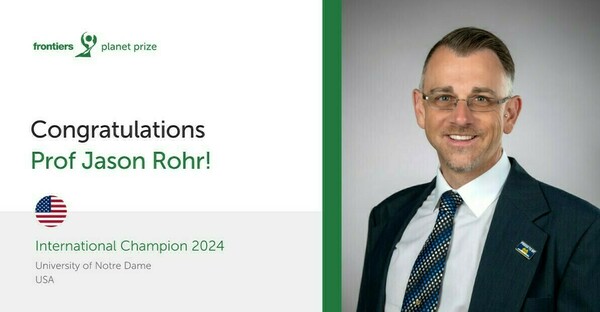Jason Rohr wins 2024 International Frontiers Prize for innovative public health and sustainability research
Jason Rohr, the Galla Professor and Chair of the Department of Biological Sciences at the University of Notre Dame, is one of three international winners of the 2024 Frontiers Planet Prize for his research that helps improve public health, agriculture, sustainability and poverty in Senegal.

Rohr was presented with the honor during a ceremony June 26 at the Villars Symposium in Villars-sur-Ollon, Switzerland. His research was selected from among the 23 national champions of the prize, which is administered by the Frontiers Research Foundation. Rohr, representing the United States, along with Pedro Jaureguiberry, representing Argentina, and Peter Haase, representing Germany, each received a prize of 1 million Swiss francs, equivalent to about $1.1 million. The money will be used to further his research.
Rohr’s winning research, “A planetary health innovation for disease, food, and water challenges in Africa,” was recommended by the National Academy of Sciences to a jury of 100 renowned sustainability and planetary health experts for the prize.
“My team and I are so shocked and thrilled to win this international prize,” Rohr said of the honor, which rewards and promotes breakthroughs that show the greatest potential to keep the earth from crossing what are known as “planetary boundaries.” These are processes that regulate the stability and resilience of earth systems, such as climate change, freshwater change and land system change.
“The Frontiers Planet Prize is a tremendous honor for Professor Rohr’s transformative research,” said John T. McGreevy, the Charles and Jill Fischer Provost at the University of Notre Dame. “We are deeply grateful for this award, which will enable Professor Rohr and his team to continue advancing scalable solutions that have the potential to enhance the lives of millions of people.
“As a leading global Catholic research university, Notre Dame is committed to caring for our common home and pursuing innovative solutions to the complex social and environmental crises our world is facing.”
Published in Nature in 2023, Rohr’s research focuses on reducing schistosomiasis, a parasitic disease affecting more than 250 million people worldwide that causes organ damage and death, and is transmitted to humans from freshwater snails that are infected with parasitic flatworms.
The snails that transmit the flatworm prefer to live in vegetation that proliferates partially because of fertilizer runoff. People can become infected multiple times when using waterways for washing and leisure, Rohr said.
However, Rohr and collaborators study more than ways to reduce disease. Their interdisciplinary approach includes removing snail-loving vegetation at water access points, composting the vegetation, feeding the vegetation to livestock and providing economic opportunities from the profitable compost and livestock feed.
“The generous grant that accompanies this prize will allow us to hone our remote sensing techniques for detecting the vegetation, testing whether communities sustain the intervention after education and training, scaling the innovation to other parts of Africa, and developing commercially viable scaling approaches,” said Rohr, who is affiliated with Notre Dame’s Eck Institute for Global Health and the Environmental Change Initiative. “This research has the potential to improve millions of lives because it equips these marginalized communities with the knowledge to develop sustainably, and to escape disease-poverty traps.”

Now in its second year, the prize is awarded by the Frontiers Research Foundation, based in Switzerland. The foundation has received prize nominations from 20 academies of science and 475 leading universities and research institutions among 43 countries. Launched by the foundation on Earth Day 2022, the Frontiers Planet Prize aims to mobilize science for a global green renaissance. The prize is endorsed by the International Science Council in its efforts to accelerate the most impactful scientific solutions.
Before being named as one of the three international prize winners, Rohr shared about his research in front of policy, practice and philanthropy thought leaders at the symposium led by the Villars Institute, an international nonprofit foundation dedicated to accelerating the transition to net-zero emissions. Rohr and the other national champions engaged with key planetary health experts, all of whom have the capability to shape policy and influence civil society.
The symposium also included a global cohort of system- and solution-oriented high school students from schools all over the world, which offered an additional chance to foster intergenerational collaboration and prepare the next generation to combat climate change.
“The remarkable contributions of the three international winners underscore the critical importance of interdisciplinary research in safeguarding our planet’s future. Their innovative approaches exemplify the spirit of the Frontiers Planet Prize, fostering a deeper understanding of planetary boundaries and providing a roadmap for a more sustainable and resilient world,” said Johan Rockström, chairman of the jury and pioneer of the Planetary Boundaries framework, in a news release.
Rohr’s research was funded by the National Institutes of Health, the National Science Foundation, the Indiana Clinical and Translational Sciences Institute and a Stanford University seed grant. A complete list of co-authors on the paper can be found at Nature.
Originally published by at science.nd.edu on June 26.
Latest Faculty & Staff
- In new research, Roy Scranton explores climate change and the limits of human progressIn his most recent book, “Impasse: Climate Change and the Limits of Progress,” Scranton, an associate professor of English, defines the impasse he sees as “not only political and institutional, but cognitive, existential and narrative” and asserts that the only path forward is through embracing what he terms ethical pessimism. “A lot of people confuse pessimism with nihilism, apathy and despair,” Scranton said. “But pessimism is actually about recognizing our limits, letting go of unrealistic goals, finding solidarity in the fact of human suffering and doing what you can now, not in some utopian future.
- Joule Bergerson, energy technology assessment expert, named new director of ND EnergyND Energy faculty director Joule…
- In memoriam: Alasdair MacIntyre, the Rev. John A. O’Brien senior research professor of philosophy emeritusAlasdair MacIntyre, the Rev. John A. O’Brien senior research professor of philosophy emeritus and a permanent senior distinguished research fellow at the de Nicola Center for Ethics and Culture, died on May 21, 2025. He was 96.
- Santiago Schnell, dean of Notre Dame’s College of Science, appointed as provost of DartmouthSantiago Schnell, the William K. Warren Foundation Dean of the College of Science at the University of Notre Dame, has accepted an appointment as provost at Dartmouth College. He will depart Notre Dame at the end of June and begin his new role in July.
- Notre Dame’s Fightin’ Irish Battalion receives Department of Defense award as nation’s top Army ROTC programThe United States Department of Defense honored the University of Notre Dame’s Army ROTC Fightin’ Irish Battalion as the nation’s top Army collegiate program for the 2023-24 academic year. This will be the first time the unit has received the department’s Educational Institution Partnership Excellence Award, which recognizes the program’s achievements in recruiting, educating, training and commissioning leaders of character to be the next generation of military officers.
- In memoriam: Karl Ameriks, the McMahon-Hank Professor of Philosophy EmeritusKarl Ameriks, the McMahon-Hank Professor of Philosophy Emeritus at the University of Notre Dame, died on April 28 from pancreatic cancer. He was 77. Born in post-World War II Germany, Ameriks’ family emigrated to the United States when he was a child, and he grew up in Detroit, Michigan. He received his bachelor’s and doctoral degrees from Yale University. He came to the Department of Philosophy at Notre Dame in 1973 during a formative time for the department, which had transitioned from a predominantly Thomist focus to the more analytical American philosophy in the 1960s.











